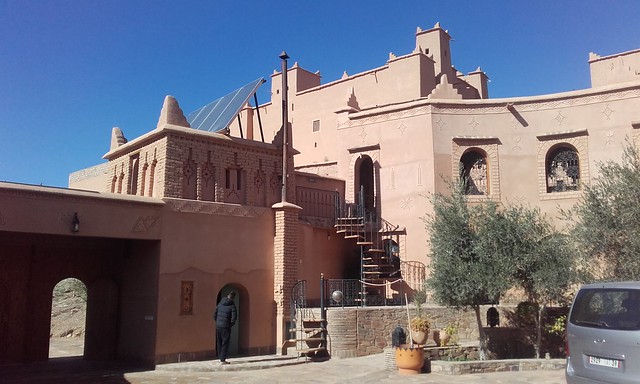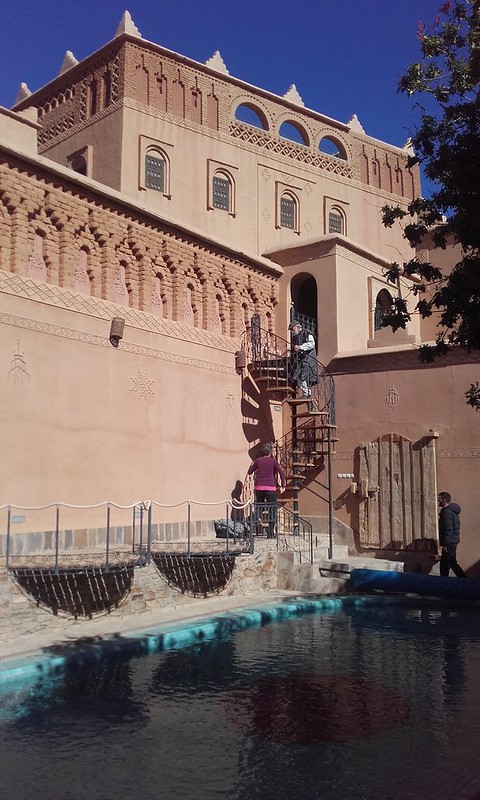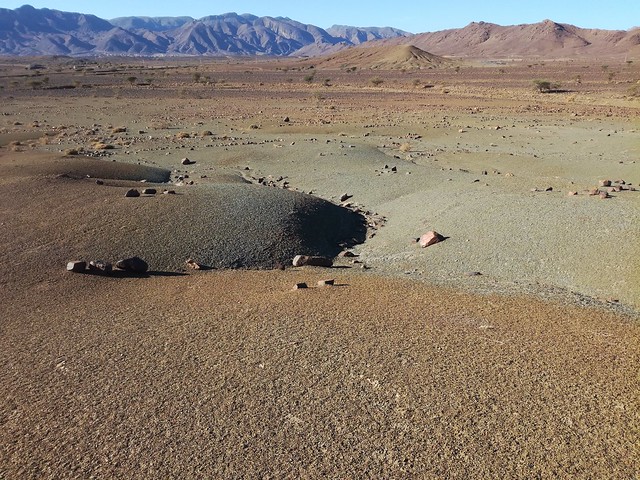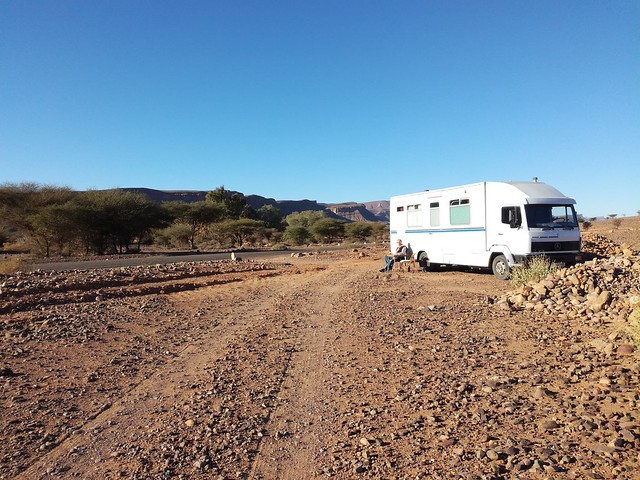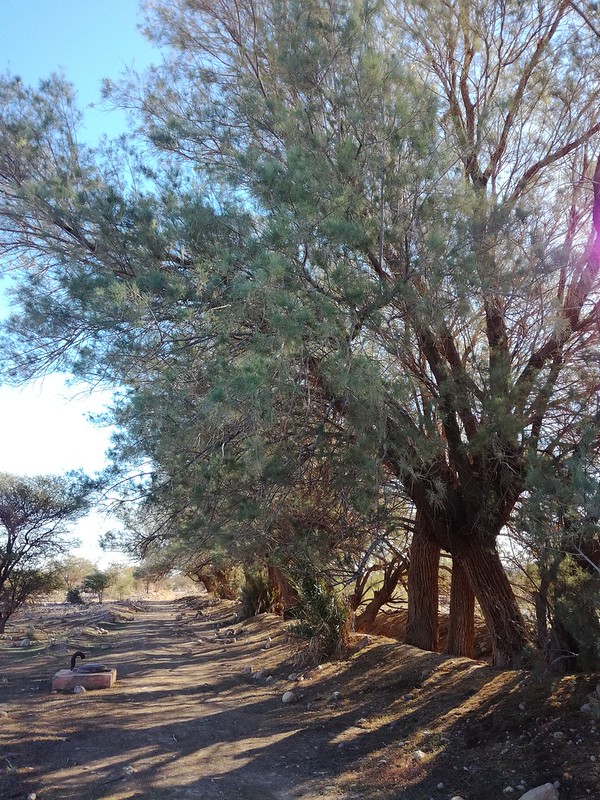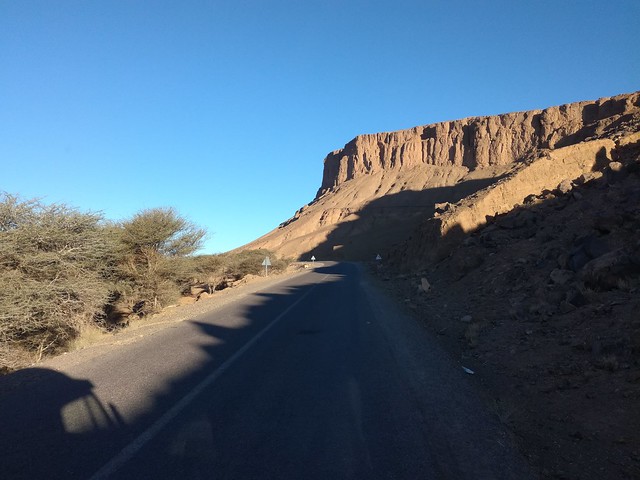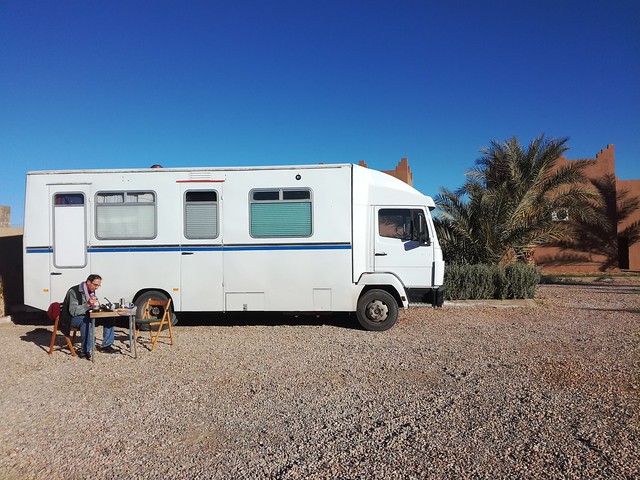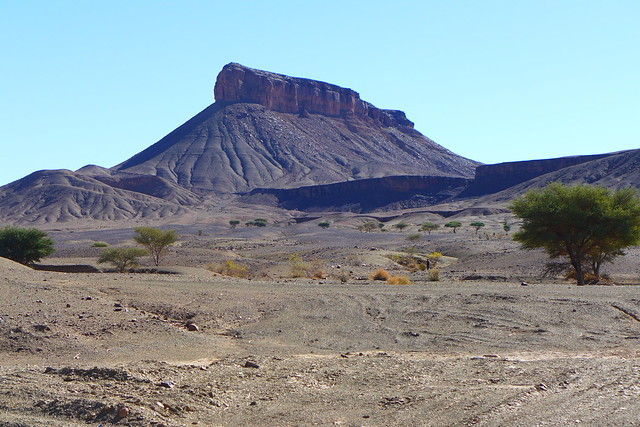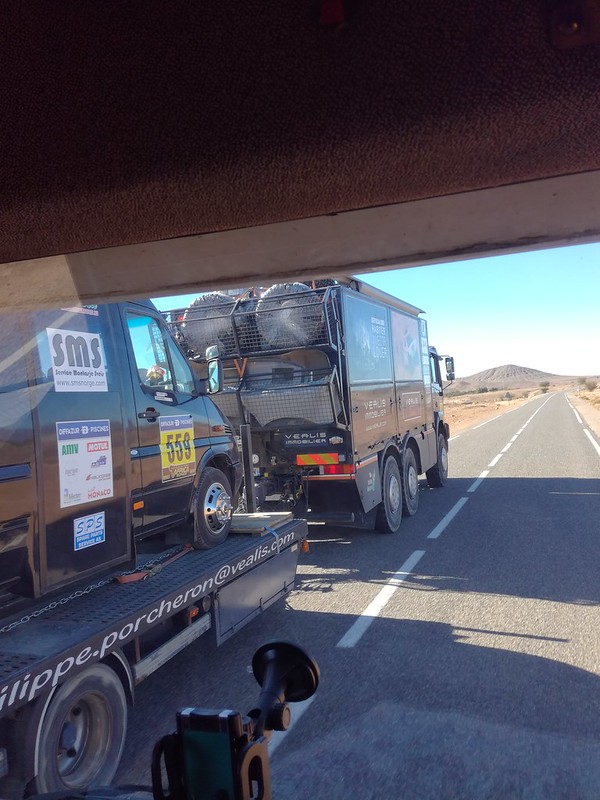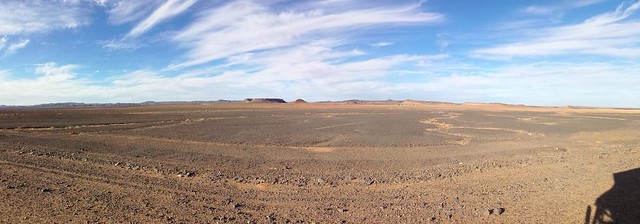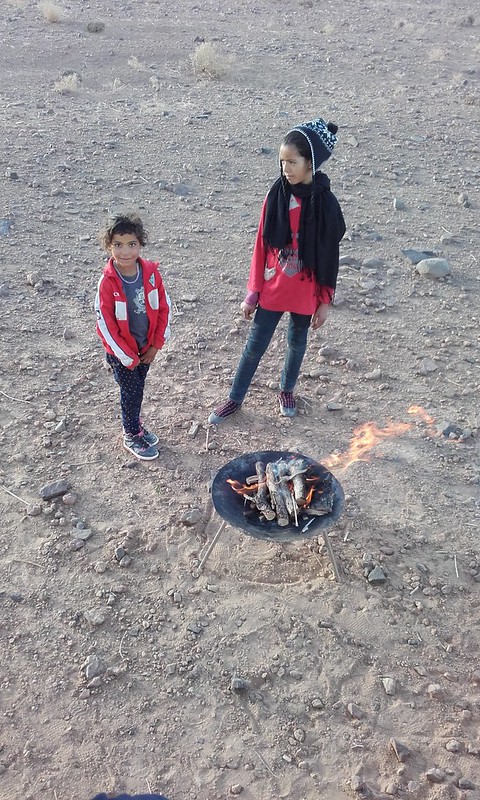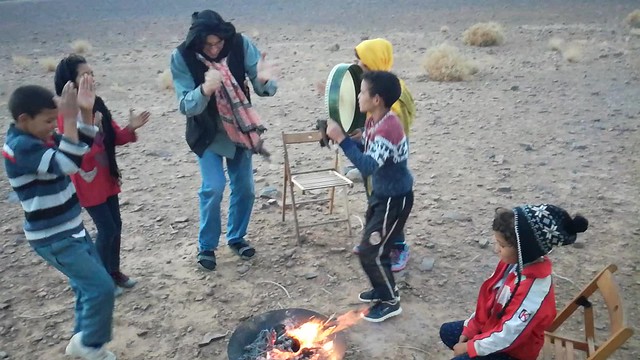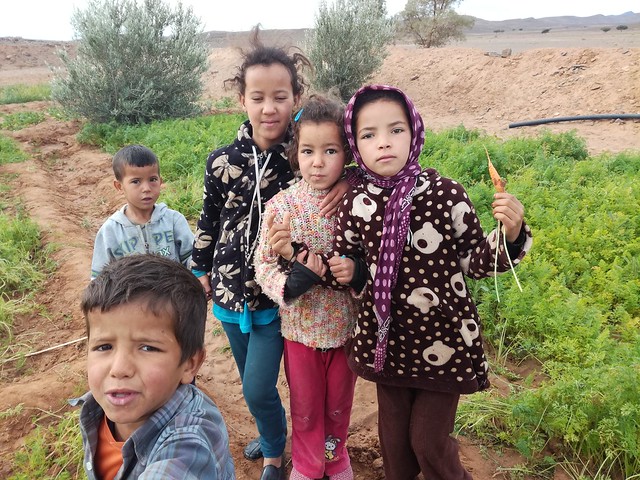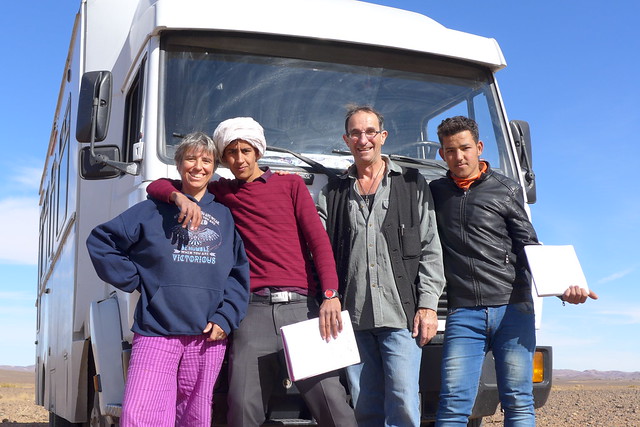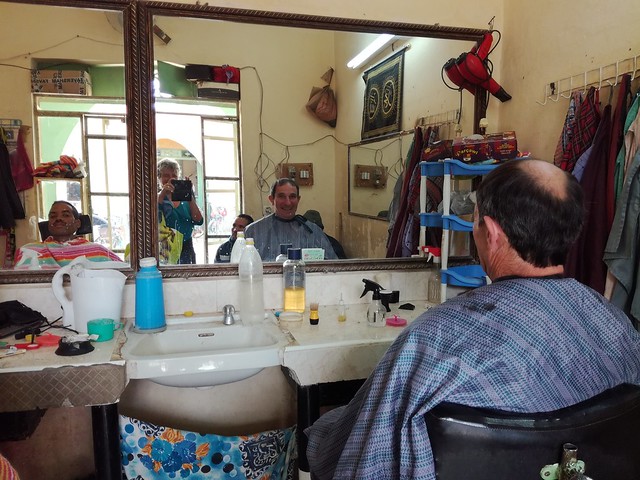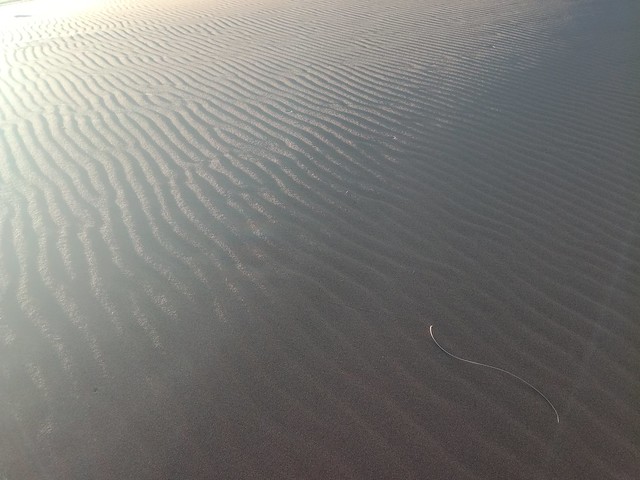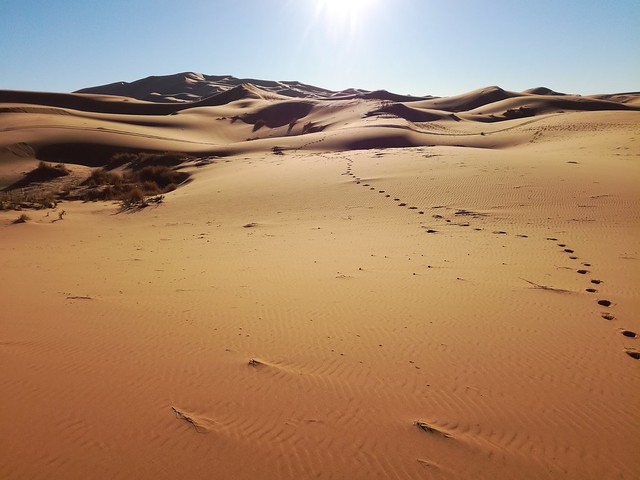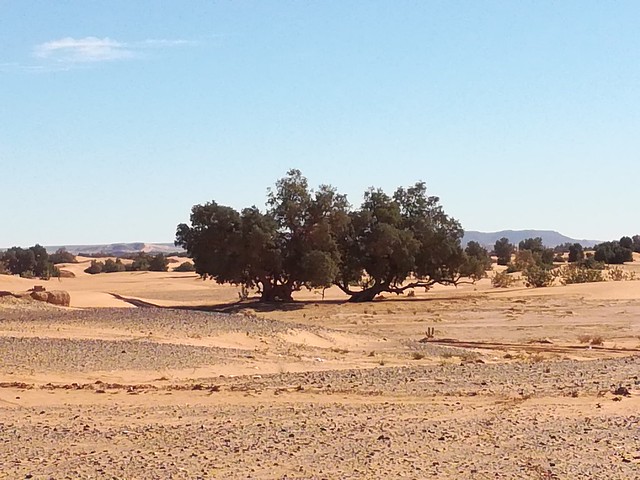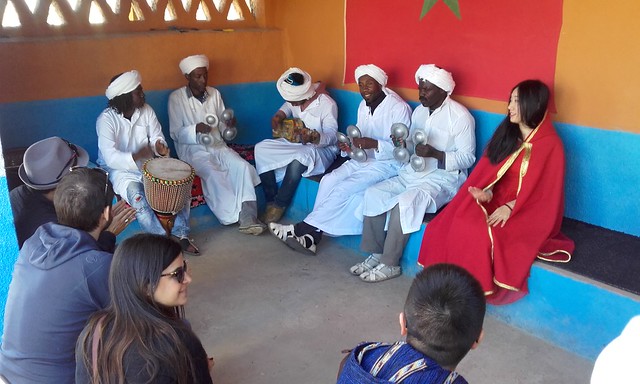Ait Omar
We’ve been told to go and seek out Hartmut, the owner of one of the 45 Kasbahs in this town, apparently you can find him every morning in the cafe on the corner, opposite the school and the post office.
After 5 days of wallowing in bed with Moroccan flu, we’re ready to have a peek at the town. Having spent all this time indoors, the sunshine once again seems dazzingly bright. I can hardly keep my eyes open. Indeed, in the cafe on the main street we meet Mahmoud, as the locals have lovingly renamed him, a German who came here about 30 years ago, bought a dilapidated Kasbah and painstakingly rebuilt it, drawing on local knowledge and materials, combining German standards with Moroccan aesthetic. The result is absolutely stunning. Ait Omar is one of the most beautiful houses we have seen in Morocco and the first one that is warm inside (underfloor heating, fed by solar panels and a wood burner)!
The traditional layout with its many rooms is spread out over a number of floors and buildings, there are little courtyards everywhere, a beautiful swimming pool in the centre of it all, and a roof terrace with views to die for. N’kob itself is full of Kasbahs and, while in a good place for tourists to reach a number of attractions, such as gorges, deserts and mountains, in itself it is not touristic – on the contrary, it is a typical Moroccan village or small town, relaxed and peaceful, with un-tarmaced back streets and earth and straw buildings, children playing in the roads and the locals giving you a friendly smile as you pass.
During our last 4 years of travel, we’ve always been on the lookout for a possible venue for a group event and although we’ve spotted a few stunning locations, as yet we hadn’t found anywhere sufficiently spacious and comfortable.
In Ait Omar, we may just have found the right place, so who knows, maybe one day we will run a Tango event here…
On our way back to the van, we stroll through the village, play hide and seek around corners with the children we meet and go door to door hunting for empty jam-jars with lids for making more Marmalade. The latter produces some hilarious ‘conversations’ with women from the different houses we call on, where we try to mime what we need the jars for. Even my little bit of Arabic is no use here, because these women are Berbers and not all of them speak Arabic, let alone French.
But in general, they are very much used to the concept of re-using items (I will talk more about this in a later chapter), so after 15 minutes we have a further 7 jars and make our way home. This is enough excitement for our first post-flu outing!
That evening, we decide we are strong enough to drive on, so as the sun sets, we head out of town, not without stopping along the way to take a look at a big restaurant called Jenna, another venue we might include in a potential group holiday to Morocco.
Night falls as we drive on. We soon stop by the side of the road on a flat piece of land that looks like its been prepared for a house. There are a lot of birds and an unusually green coloured hill. Next morning, I take a walk to explore what is growing on them, but it’s not plants that make the hill green but the stone itself – a finely broken type of green slate. Subsequently, we often see this material being used for roads that lead through the stony desert.
for more pictures of Ait Omar as well as the beautifully undulating slate hills, click here
Posted in Uncategorizedwith comments disabled.
N’kob
It didn’t take long for the bugs to germinate in our bodies. This morning, I’m not feeling too well, so we stop off by the side of the road for me to have a rest and for Frank to have breakfast.
Down the valley from us is a row of unusual looking trees, almost willow-like in their shape. Surely, willows can’t survive in this arid climate? After breakfast, Frank takes his camera and goes out for a recce, while I lounge in Emma with the sun streaming through the open door onto our bed.
However, even an hour’s rest is not helping much, so we decide to turn into a campsite for the day. The next little town is called N’kob and park4night tells us there is a camp site called Ouadjou, so by 10am we turn into their compound. There is an area for campervans, a garden with some berber tents, a swimming pool, some rooms to rent and a restaurant. Right next to where we are parked, a rickety ladder is leaning against the wall, on the other side of which a plume of smoke mingles with delicious smells of fresh bread. Frank, being Frank, climbs up and starts chatting with the women gathered around their clay oven, the other side of the wall and gets invited round by the family and even manages to buy a loaf of bread from them – the best one we have tasted since coming to Morocco.
The camp site manager is a bit non-plussed when Frank walks past him with a loaf of fresh bread within 10 minutes of our arrival! I, however, am struck down and Frank follows me 24 hours later. We spend the next five days coughing, snotting and sweating it all out in a good, hot fever. It’s quite something when your body is not at all familiar with a particular strand of cold virus! Luckily, we are able order delicious Tajines from the camp site’s restaurant which they deliver to our van, so we don’t starve. We also have enough wood in our store not to feel cold at night, when temperatures outside drop to zero. One day a mighty wind picks up and blows dust everywhere. It is so hard that it wheezes through the closed windows and doors of our Emma and we find desert dust settled on our clothes and furniture for days after. I lie in our comfortable bed, with the lovely wood-burner to keep me warm and my thoughts turn to Youssef’s family in their house without windows or doors and no heating of any kind, just a shell of a house where the wind can blow straight through! Wow, people here are hardy!
Camping Ouadjou has been a great stop, it’s lovely and quiet here and provided us with everything we needed to rest and recover from our illness.
******************
For more photos of this chapter, click here
Posted in Uncategorizedwith comments disabled.
Youssef and his Family
The late afternoon light is always exquisite in Morocco, so I decide to descend into the riverbed and go on a little wood forage. I see a large pile on the other side of the pebbly, completely dry expanse that obviously sometimes becomes quite a raging river, but my guess is that this belongs to the house 40mtrs further up and I’d be loathe to be discovered ‘stealing’ wood, even if I didn’t intentionally do it. I walk along the riverbed into the sunset. Half a mile further down, I give up. There are plenty of bushes and no doubt the river brings along chunks of wood too when it flows, but there is absolutely nothing to be found – someone, or probably a whole lot of people, have been here before me. I return empty-handed to Emma. Just when I get to the bridge, I see two old women walking home, bent double under the huge weight and sheer bulk of firewood they have collected in the afternoon, god knows where, wrapped in a handmade Berber cloth, the size of a double bed sheet.
As promised, not long after sunset, Youssef turns up, climbs into Emma and we tootle off to his home in a little town by the side of an oasis. When we arrive, the whole family is crowding onto the street to welcome us, mother, sisters, cousins, and many children.
Over the last years, Youssef has built a big house for his near and extended family. It’s by no means finished, but they have already moved in. Maybe they have another house in the village, we don’t know, but for tonight they are all here, including his ailing father who is recovering from a recent eye operation.
The house has electricity, many rooms, several storeys high, a television, a washing machine and a basic kitchen, but apart from that, there is a distinct feeling that this family has only just moved in, or possibly it’s their first house ever. It is literally still a concrete shell with holes for windows, no heating and hardly any doors and yet, the family is happy and very proud to show us all the nooks and crannies. So what I don’t understand, there are at least twelve people in this family and we get shown the whole house. In one room, I see two suitcases, but apart from that, there is no evidence of where people keep their clothes – no cupboards or shelves. Ditto in the kitchen, no tables or chairs and very few cooking utensils. The work is done on the ground, maybe a tarpaulin is spread out and this is where vegetables get peeled and food prepared.
It’s one thing to get one’s head around how little people need here to make their lives work, but there is another thing that I fail to understand: When you go to the souqs, there are many, many stalls offering stuff. You can get everything there – clothes, toys, kitchen utensils, carpets, food, furniture etc etc. But who buys all this, and where do they put it??? Every time we get invited to a house, we are struck by the sparseness. Even in families where we think it’s not out of necessity but out of choice.
We spend a lovely evening with the family, making paper boats, planes and birds, talking to Youssef’s lovely parents and partaking in a delicious couscous. Youssef’s mother takes my hand and won’t let go. She shows me all the women’s parts of the house – the kitchen, the washing machine, the haya – a window, from where she can watch the road without being seen (this is a deliberate architectural design quite common to houses here, so never think there’s no-one watching you!). At some point, I get whisked out onto the road – all the women of the neighbourhood and a whole lot of children meet outside someone’s house to share a very large tagine of couscous. This is the custom in this village, and families take turns to provide the tagine. I get pulled into the fray and Youssef’s sisters and sister-in law reach over the kids heads to grab a handful of couscous and vegetables, deftly rolling the food into a ball and passing it to me. I don’t know how many hands have been in that Tagine and where they’ve been before but there is no way I can refuse this offer of female solidarity, and besides, the food is delicious. I wash it down with a swig of water from the one metal cup offered to me, a cup that all 15 women and 30 children, use. Ah, what the heck, I drink it down gratefully. This is about being invited to be part of what’s going on. It’s an honour to be here and to be treated as one of them.
To complete the natural Morrocan inoculation programme, we also hug and play catch with the delightful children of the house, ignoring their hacking coughs and snotty noses.
Eventually, the family is ready to eat. A delicious couscous is served to us and the men of the house. The women are nowhere to be seen, apparently they eat or have already eaten elsewhere, and the children are told to sit by the wall and wait. Once we have finished, the dish is taken elsewhere, some more food added and it’s the children’s turn to eat. We are a bit surprised that not everyone gathers and eats together, but this is the way things are done in this house. Youssef has the main say here, and he walks around arranging everything, telling his family members what to do, when and where. His mother looks at him proudly – like so many older Berber women we meet, she has a happy, content look on her face and she obviously loves having all her family around her. She is a hard worker and she sees everything. It seems like she is able to comment freely on everything too. Looking into her eyes, I feel a thick stream of love and again and again, she takes me into her arms and hugs and kisses me, smiling and showering me with words I don’t understand.
Its quite intense, the way we re looked after in this house, so by about 10pm, we are happy to ‘escape’ to our van. The next morning we’re up early and ready to go before most of the family are awake. We slip into the house where all except the mother are still asleep. We bid a wordless but emotional good bye. Her eyes are brimming with love and she gives us big hugs and kisses.
The village is just awakening. We pass by children on their way to school, waving and smiling at us, and men and women using palm brooms to sweep the front of their houses. Everything looks fresh and tidy in the morning sun. We cross the river and turn right, back up the road to Tazzarine and off westwards from there.
Posted in Uncategorizedwith 1 comment.
Tazzarine
Moving on from the camp site Hotel Kasbah Meteorites, our first priority is to find someone who can help us repair the window mechanism in the driver’s door.
We drive on to Tazzarine, another funky town. We find a garage straight away where a young guy tries his luck for about half an hour before taking us 100 m further down the road to a bodyworks place. The ‘chef’ is not there, so we wait a bit until he returns from the souq on his little moped. He takes one look and knows exactly what to do. It involves dismantling the mechanism even further than we already have done, in fact removing it from the door entirely and replacing the bolt that must have come loose on all these bumpy Moroccan roads. Putting it back together again, he replaces a whole lot of worn plastic parts, tut-tutting at previous attempts to make do with lesser solutions. A real perfectionist – Emma is in the hands of a good craftsman here. After an hour or so of giving Emma TLC, he asks for 200dirham, which we gladly pay and we’re off on our next adventure.
We seem to be in luck with passing towns exactly on the day of their weekly souq. Tazzarine is heaving with people. Even though we still have food left over, we can’t resist stopping for a stroll through town, and who do we bump into but our mechanic. It seems as if, on Wednesday, everyone stops their work to meet in the souq, and he must have just interrupted his visit to the souq to return to the garage and help us with the window problem.
We find a type of citrus fruit that is neither an orange nor a lemon, so we buy some of them, even though the locals say they aren’t for eating but to use on your skin and hair. That sounds like it could be a kind of Bergamot, so we take a load of them to add to the next marmalade-making session. We meet Youssef, a smiling, well-spoken man who invites us back to his family home some 20km South of Tazzarine. He has some more shopping to do, and he instructs us to wait for him by the riverside and where he’ll join us shortly after sunset.
*******
for some photos of the beautiful landscape we drove through in those days, click here
Posted in Uncategorizedwith 1 comment.
Beldi (not for the faint-hearted!)
Beldi is the word for free range. We’ve been on the look-out for a beldi chicken for some time, so when we come through Alnif, we stop at the souq to try our luck again.
We ask at the first chicken shop, but he only has the white variety. He leaves his shop to help us find a brown one with a happy past. Everywhere we ask, we get funny looks, as if it’s a really crazy idea to want a Beldi chicken. Finally, on the edge of the souq, by a dusty road, we find our man. On a tarpaulin, he has a whole lot of second hand clothes spread out (none of the things we gave the women yesterday are to be seen, thankfully), and by the side of his second hand store, there is a box full of live chickens, plus a cockerel and a fat hen ducking into the dust beside it. Our young guide haggles with him on our behalf for a while until we agree the price of 80dh for the fat hen, including getting her killed, plucked and otherwise made ready. I’m not quite sure how he’s going to do this, but he tells us it will take about 20 minutes. We agree and he goes off, so Frank follows him as we have already handed over the cash. Meanwhile, I watch his second hand stall.
Several people come by and I tell them to return in a little while. One woman stops and chats with me. Eventually, the men return, we take the chicken with us and as we say good-bye, I ask the guy for 20 dh for having watched over his stall. For one moment his face shows pure shock, but then he realises I’m just joking and he thinks it’s really funny.
We look forward to a Beldi chicken tajine. However, this chicken is the toughest thing we ever met. Two hours of cooking is not enough, so the next day it gets re-cooked in a stew, and the day after once more in a soup. We did eventually eat it, thinking about the fact that it lost its life specifically for us, so we just can’t not consume it, but maybe that’s the reason why everyone looked at us as if we were mad. Those white, fast-growing chickens are probably a whole lot more tender!
Generally the meat here is very good quality, and I think this is the reason for me needing to eat less and less of it.
The next part of the journey takes us through an impressive landscape of stony plateaux and black mountain ranges with rugged edges.
As the sun goes down, Frank and I discuss where to stop for the night. We like wild camping, and there is absolutely no safety issue about this down here in the South of Morocco. We’ve rarely felt so safe anywhere else in Europe. But we are urgently in need of a really quiet time, somewhere we can be sure not to end up receiving another string of visitors, so we turn into a camp site. Besides, one of Emma’s windows seems to have lost a part in the winding mechanism and we cannot wind it back up again. The ‘camp site’ is just a graveled courtyard by the side of a hotel complex, but that suits us fine right now, it’s secure and quiet and we’re the only ones. They are happy for us to make our bbq outside the van, and so we sit there in the fading light, enjoying that for once, no-one, not even the hotel staff, is looking after our well-being.
The next day, we stay holed up there while a Big Ralley is thundering past – huge lorries that are in a terrible rush to get somewhere, overtaking and cutting in. What a way not to experience this landscape!
Posted in Uncategorizedwith comments disabled.
Desert Encounters
After a few kilometers of driving, we think we have found the perfect spot – a flat, stoney expanse with no houses in sight. I like to experience the stillness of this place. It’s so far away from everywhere, there isn’t even any reception for the phone, despite it being completely flat for miles.
Little do we know that the spot we’ve chosen is in the middle of the Universe for some… not five minutes after stopping, some girls who are hearding goats come running helter-skelter towards us. They have to catch their breath for a minute before they manage to ask us to ‘donne-moi un bonbon’.
Each time we are asked, we get more determined to respond in other ways. So this time round, we get involved with them, we ask for their names, I try to write them down with their assistance, we invite them to help us with the fire, we share some dates, we look at books together, we juggle with stones and we tell them about our lives in the UK.
They discover we have a tambourine and it turns out the older girl is really good at playing it. They all break into song and start dancing. Later some boys join too, one of them proudly showing us a gecko he caught and gutted, ready for his family’s dinner. If you look closely in the video, you’ll see the boy holding the dead gecko.
They have so much fun with us that they forget to look after their goats, who meanwhile have disappeared. I go and help look for them, but they seem to have made their own way home. It’s getting dark so the kids take leave too, skipping off across the desert to I don’t know where. How far away is their home, I ask. 50 kilometres answers the girl, but the boy says, she’s joking. It’s about 2 km across the desert.
The next morning, I wake up early. I’d like to go and deliver a letter and a photo we took of the girls. I’d like to point out to them how different things can be when we make a real connection; how nice it was to spend some time laughing and playing together, rather than just handing out sweets.
After a 2km walk, I reach the house of the boys from the day before. It is 8am and the whole family is outside, having watched me approach the house from far away. They invite me for breakfast, but I would first like to deliver the letter, so they point me on over the hill. On the brow of the hill I see that it’s still quite a way to the next houses, so I turn back and hand the letter to one of the boys to pass it on.
This time round, the family will not let me go without joining them for breakfast. I am offered a delicious savoury porridge and some bread. The mother of the family tells me she has ten children. Some of them are standing right in front of me, looking longingly at what I’m eating, so I hold out my bread to share and they are at it in a second but are then told off and have to deliver their loot back to the outdoor kitchen. I have half of the broth and pass the rest back with thanks, which is then distributed between them.
They are desperately poor here, I realise. This is the house where an eight year old brings home a gecko for dinner, as a special treat! But they are determined not to show it. There is no ‘donne-moi’ to be heard here, on the contrary, the eldest daughter is told to show me the garden. She’s got a bag in her hand and keeps trying to offer me vegetables to take home. I insist I only want to look. In the end, she is grateful that I accept some fresh mint. It is impressive how they have wrested a large garden from a stony desert. Also, how do they protect it from marauding goats? There are no fences…
When I get back to the van, Frank is a bit agitated. I’ve been away for too long and he’s meanwhile been besieged by three very pushy women and their children, demanding shoes, clothes and money. We give some clothes and refuse a whole lot more demands. We’ve by now heard that often they will take anything, even clothes that don’t fit, and it all ends up being sold in the souq. Eventually the women move on with their donkeys and children. Somehow these experiences always leave us with a bad feeling. This ‘pushing and resisting’ dynamic is dissatisfying and also exhausting.
Just as we are about to leave, two young men turn up. They are the older brothers of the children we met yesterday, and they have arrived with their school notebooks. They just want to say hello, practise their French and English and make a connection. So we stop Emma again and we hang out together for an hour. This is a much nicer way to finish our time here in this rather busy spot of desert!
It’s exam time in Morocco, with most exams scheduled for January 4th, that’s why we see so many young people walking around and looking at their revision notes.
for photos of this part of the journey, click here
Posted in Uncategorizedwith comments disabled.
Desert Souqs
I’m not usually a fan of shopping, but the souqs in Morocco are a delight, especially as you come further down south. Just before reaching the desert we stopped off in Erfoud where we experienced the joy of three souqs next to each other. Some kids surrounded our van as we parked up and clamoured for biros, sweets etc. We went in the back of the van and put our jellabahs and turbans on. When we opened the door, the kids, ready to pounce, gasped and moved away – they were shocked by our transformation, which seemed to instill an instant respect. They let us through without a single ‘donne-moi’.
The first souq was quite full of tourists, and we instantly acquired an unwanted guide who ignored our protestations that we didn’t need help finding our way around.
The second souq was another matter altogether, it was like a vegetable wholesale place, and the third one was for chickens only. This is not for the fainthearted, especially if you’re also vegetarian and I’m bordering on being both fainthearted and vegetarian! Chickens are held in the back of shops, you choose one, it gets killed, drained, quickly put in a boiling vat, then in a kind of centrifugal, hoovering type of spinner that sucks off all the feathers and bingo you have your fresh chicken, faster than a haircut. We forewent the chickens in this souq, mainly because they were all of the white, fast-growing type that never sees the outside. We shall wait until we find a free-range chicken.
After our desert time, the next Souq we experience is Rissani. Here you dive into a densely built area of houses where in little alleyways all sorts of vendors offer their wares. Frank is looking for a haircut and starts bargaining in various shops. After going into a bazar and managing to come out without having bought anything (it was a narrow escape, it felt like we might be taken hostage until we bought something), I’m tempted by the smell of berber pizzas wafting from several wood-fired bakeries that have their doors open to the alleyway. We point to a freshly baked one asking for the price, which is followed by 10 minutes of negotiations and then a half mile walk back to the restaurant where they are trying to give us an older one. Why can’t we just buy from the bakery? Well apparently they are all spoken for. We leave the restaurant and end up instead having a delicious bean soup and Berber whiskey (Moroccan tea) from a friendly street stall. Frank finds his barber where he can have a haircut for 10 dirham (one Euro) while I go in search of wooden clothes pegs and a box of matches.
There is no shortage of things in this souq, I find many hardware stores and plenty of plastic clothes pegs and cigarette lighters, but not what I’m looking for. People look at me in a strange way when I insist on wood in preference to plastic.
It is New Year’s day and everywhere I go people wish me a happy New Year, even though they themselves mainly operate on a different calendar.
We buy some good quality lamb for a tajine and we drive on to find a quiet place in the middle of nowhere to cook it on our bbq (we have to take care about how much gas we use, to ensure we have enough for 3 months. There aren’t any GPL outlets in Morocco as far as we know – if anyone knows of one, please do get in touch!!!).
For more pictures of this chapter, click here
Posted in Uncategorizedwith comments disabled.
Camping in Hassilabied
(We continue our story. This chapter happened in between xmas and New Year)
I feel quite fragile, so we decide to go to a camp ground to recover. As soon as we arrive, Frank falls into bed and sweats off the delayed shock of the near accident in a 24hour fever.
The family who run this campsite are extremely welcoming and attentive to one’s needs, always around, keeping the grounds clean and helping people. Freshly baked bread is delivered to your door if you choose and Berber tea is always available. It’s the perfect place to stop and let down your guard – except for the noise of quads and 4×4’s outside the camp-ground. The dunes are a giant playground for people, and there are many who obviously haven’t noticed that crashing through them on noisy vehicles destroys much of what is special about the desert. And the noise doesn’t stop when you switch off the engine. I guess, if you’ve been screaming up and down sand dunes all day, you don’t mind carrying on using maximum volume in all your other interactions.
Hassilabied, a sleepy little town on the edge of the dunes, suffers greatly from this – the noise is constant and a great cloud of dust hangs over the village most of the day and evening and children who want to play in the open space between house and dune are at risk of being run over by cars using the stony ground as a race track, not even on clearly demarcated roads.
It seems to me that this town, along with all the others around the desert, will each have to make their own choices (and possibly also regionally) about which type of tourism they want to promote, because 4x4s and the more quiet type who would like to experience the silence and the beauty of this place are incompatible. One option would be to restrict 4x4s to certain areas. Apparently there is a group of locals lobbying for this, but they feel they aren’t being heard. Fast money seems to speak louder, and quad-hire places and hotels are mushrooming. It is shortsighted of the tourism development agency to let this develop randomly. The loud people will drive away those who come looking for a more peaceful connection with nature.
We are told it’ll get worse for New Year’s eve, so after a second night, we escape back to our parking place by the dunes, 5km further north in the middle of nowhere.
We can recommend the campground for the very welcoming family who run it, for the lovely shady places they have and the whole way the camp-site is run. The family was also at pains to point out that it’s not always as loud outside as it was during our time there. Avoid Spanish holidays if you’re thinking of coming here!
Here’s a link to their web site
************************
Posted in Uncategorizedwith comments disabled.
( In Parentheses, January 22nd)
Since posting the last few chapters, we’ve had a number of close friends writing concerned emails to me. This chapter now is me speaking today, 22nd of January, but please remember that all other chapters are 2-3 weeks behind time. It always takes us a bit of time – I have to write the stories and Frank corrects my English, together we upload photos from the camera and our phones, sort through them and upload everything in the correct order…. meanwhile of course new experiences tumble in and need to be digested and written down etc etc. We are trying our best to keep up with ourselves.
So the bad news from family and friends that I refer to in my recent chapters happened three weeks ago, and thankfully there have been NO further traumatic incidents!
Grief is a very personal thing of course and a blog is a very public thing. While trying to be as open and honest as possible in my writing, there are many things that I can’t or don’t want to write about. However, they affect the way we see and feel, so if you can read between the lines, you will find or feel more than meets the eye. The series of desert photos speak about how we felt in the days after receiving all this news. I’ve not been one to take photos until now, but something in those tough days around Christmas and New Year has opened in me and made me see things differently.
There is one piece of tragic news from before Christmas though that I do want to write about today, partly because it’s public anyway, as it’s been all over the local Devon news and the social media, partly because as a Tango dancer, you may well know the person involved and therefore may want to know about it and help her.
Just before Christmas, Frankie Gould, who used to be our kitchen mama at the Mango for a number of years, was involved in a horrendous car crash and tragically her three year old son Reuben was killed. Frankie has had surgery for a severely broken arm which has gone well, although she won’t be able to return to work for a while yet.
I still cannot comprehend that Reuben has gone and cannot begin to imagine how this must be for Frankie and her partner Tom.
A crowdfunding site has been set up to help support her for which I post a link here in case any of you would like to contribute. The money of course has been hugely helpful for Frankie, but more so I think the fact that it has come from so many people.
For a second instalment of desert photos, click here. Shadow and light, eternal movement of sand and wind, the ephemeral nature of beauty and the fragility of life.
Posted in Uncategorizedwith comments disabled.
Khamlia
We still haven’t heard any Moroccan music, so this morning we are heading towards a little village on the Southern end of the Erg Chebbi desert, where we’ve been told of a music association, based in a cafe, with live music day and night. I’m curious about this permanent jam session…
We’re pootling along the dead straight Route Nationale 13, flat, stony desert on both sides. In my thoughts I’m still reminiscing about the morning’s dawn walk all the way up to a high dune with stunning panoramic views all round…
A minibus is approaching the road from the left, going very slowly on a dirt track. There is no explanation as to why the driver may not have seen us, but we are really close when we realise he isn’t going to stop. There is no more time to break to avoid a crash – Frank has to swerve hard to the right to avoid him, but then counter-steer hard to the left to prevent Emma from hurtling off the road down a bank. It doesn’t bear thinking about. When we come to a stop, we can see that we have avoided the crash on the left and a somersault into a field on the right, by only 5cm each side. The driver makes some very apologetic gestures and we motion him to drive on. Frank and I are shaken. I have a slight whiplash in my neck and he’s pulled a muscle or tendon in his hand from wrestling with the steering wheel. Some things in the back of Emma have shifted position, but apart from that, everything is ok.
That was a very narrow escape!
I feel the fragility of life – how one moment can change everything.
This Christmas has had more than its fair share of tragic news from family and friends – which did not end as happily as our near accident, and they all rush into my mind there and then, making me feel close to the harsh finality of those moments.
We stop a little while by the roadside to regain our composure and then move on to Khamlia. Everything feels bizarrely remote now. Before I can go into the cafe, I need to walk off the shock. We meander through this sandy village, the houses partially eaten by sand (a French artist who runs a cafe here tells us that the dunes are slowly moving towards the village). I marvel at the strength of trees to grow to such a magnificent size despite the obvious lack of water.
We stop by a man selling beautifully embroidered shawls. Finally, we are ready to return to the cafe.
The musicians are actually from a tribe that is not native to Morocco but further south, I think Mali. They wait until they have a contingent of tourists and then they present three or four songs, complete with drumming and dancing. It’s nice what they are doing, but after watching it repeat a few times, I realise, it’s not really much fun for them but hard graft with few breaks, because even when no-one is there, they need to go and sit out the front to attract the next batch of Chinese, Portuguese, Swedish, Americans….etc.
Frank and I stay for lunch – eating out is a rare occasion for us but today we have reason to celebrate, so we treat ourselves to a delicious Berber Pizza and two different kinds of Salads.
for more photos of this chapter, click here
Posted in Uncategorizedwith comments disabled.
